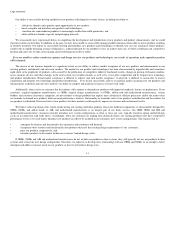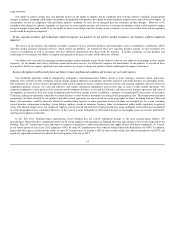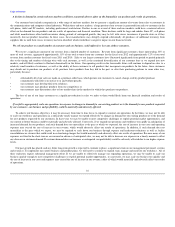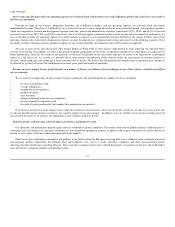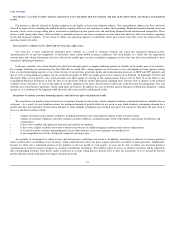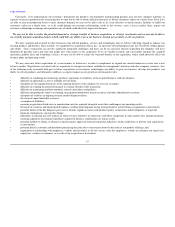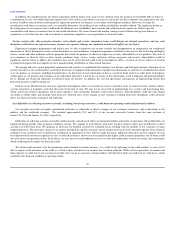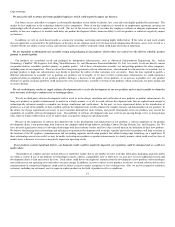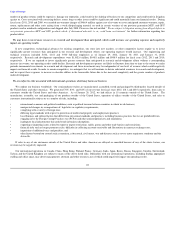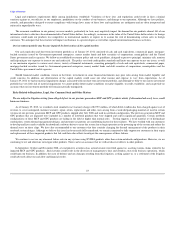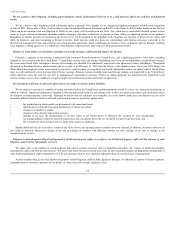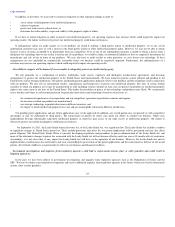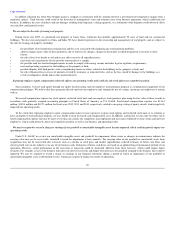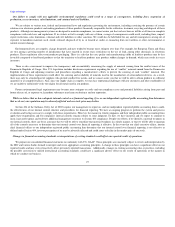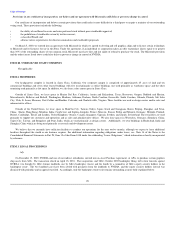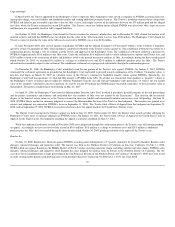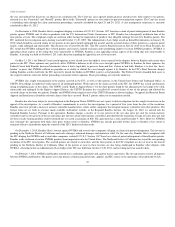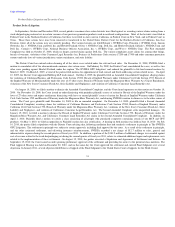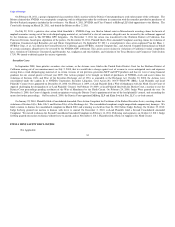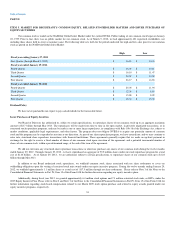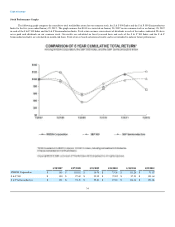NVIDIA 2012 Annual Report Download - page 25
Download and view the complete annual report
Please find page 25 of the 2012 NVIDIA annual report below. You can navigate through the pages in the report by either clicking on the pages listed below, or by using the keyword search tool below to find specific information within the annual report.
Table of Contents
We are a party to other litigation, including patent litigation, which, if determined adversely to us, could adversely affect our cash flow and financial
results.
We are a party to other litigation as both a defendant and as a plaintiff. For example, we are engaged in litigation with parties related to our acquisition
of 3dfx in 2001. Please refer to Note 14 of the Notes to the Consolidated Financial Statements in Part IV of this Form 10-K for further details on this lawsuit.
There can be no assurance that any litigation to which we are a party will be resolved in our favor. Any claim that is successfully decided against us may
cause us to pay substantial damages, including punitive damages, and other related fees or prevent us from selling or importing certain of our products.
Regardless of whether lawsuits are resolved in our favor or if we are the plaintiff or the defendant in the litigation, any lawsuits to which we are a party will
likely be expensive and time consuming to defend or resolve. Such lawsuits could also harm our relationships with existing customers and result in the
diversion of management's time and attention away from business operations, which could harm our business. Costs of defense and any damages resulting
from litigation, a ruling against us, or a settlement of the litigation could adversely affect our cash flow and financial results.
Changes in United States tax legislation regarding our foreign earnings could materially impact our business.
Currently, a majority of our revenue is generated from customers located outside the United States, and a significant portion of our assets, including
employees, are located outside the United States. United States income taxes and foreign withholding taxes have not been provided on undistributed earnings
for certain non-United States subsidiaries, because such earnings are intended to be indefinitely reinvested in the operations of those subsidiaries. Throughout
the period of President Obama's administration and as recently as on February 13, 2012 with the release of the administration's fiscal year 2013 budget, the
White House has proposed various international tax measures, some of which, if enacted into law would substantially reduce our ability to defer United States
taxes on such indefinitely reinvested non-United States earnings, eliminate certain tax deductions until foreign earnings are repatriated to the United States
and/or otherwise cause the total tax cost of U.S. multinational corporations to increase. If these or similar proposals are constituted into legislation in the
current or future year(s), they could have a negative impact on our financial position and results of operations.
Our operating results may be adversely affected if we are subject to unexpected tax liabilities.
We are subject to taxation by a number of taxing authorities both in the United States and throughout the world. Tax rates vary among the jurisdictions in
which we operate. Significant judgment is required in determining our provision for our income taxes as there are many transactions and calculations where
the ultimate tax determination is uncertain. Although we believe our tax estimates are reasonable, any of the below could cause our effective tax rate to be
materially different than that which is reflected in historical income tax provisions and accruals:
• the jurisdictions in which profits are determined to be earned and taxed;
• adjustments to estimated taxes upon finalization of various tax returns;
• changes in available tax credits;
• changes in share-based compensation expense;
•changes in tax laws, the interpretation of tax laws either in the United States or abroad or the issuance of new interpretative
accounting guidance related to uncertain transactions and calculations where the tax treatment was previously uncertain; and
• the resolution of issues arising from tax audits with various tax authorities.
Should additional taxes be assessed as a result of any of the above, our operating results could be adversely affected. In addition, our future effective tax
rate could be adversely affected by changes in the mix of earnings in countries with differing statutory tax rates, changes in tax laws or changes in the
interpretation of tax laws.
Litigation to defend against alleged infringement of intellectual property rights or to enforce our intellectual property rights and the outcome of such
litigation could result in substantial costs to us.
We expect that as the number of issued hardware and software patents increases and as competition intensifies, the volume of intellectual property
infringement claims and lawsuits may increase. We may in the future become involved in lawsuits or other legal proceedings alleging patent infringement or
other intellectual property rights violations by us or by our customers that we have agreed to indemnify them for certain claims of infringement.
An unfavorable ruling in any such intellectual property related litigation could include significant damages, invalidation of a patent or family of patents,
indemnification of customers, payment of lost profits, or, when it has been sought, injunctive relief.
24


